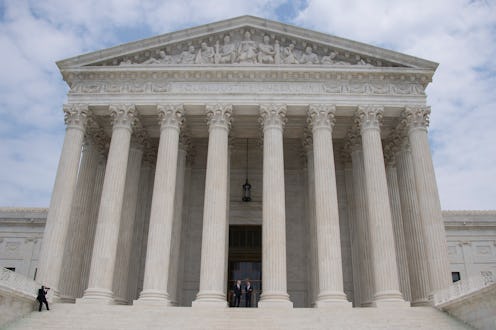News
SCOTUS Rejects Political Donation Caps
On Wednesday morning, the Supreme Court, along a 5-4 split, ruled against caps on aggregate political donations — a major victory for those who want to see campaign finance rules watered down or dismissed. In short, political donors can now donate money to as many candidates or committees as they want, as long as they stick within a set financial limits for each campaign.
It's the most significant campaign finance ruling by the Court since 2010's high-profile Citizen's United case, which opened up the electoral system to unlimited spending by corporate entities on free speech grounds. That same central argument — that spending money to influence political elections is itself a form of protected speech — was cited positively in today's ruling.
To be clear, the change that's occurred doesn't relate to individual donation limits. The most a single person is allowed to donate to a federal candidate in a primary or general election was $2,600 before the ruling, and it remains so now. The upper-limit imposed on aggregate donations to candidates, however, which used to be $46,200, has been removed altogether. So too has the $70,800 limit on donations to parties and groups.
The suit was brought by Alabama businessman Shaun McCutcheon, the CEO of Coalmont Electrical Development, and an activist and money-man in Republican Party politics. In practical terms, it means that uber-rich, politically motivated citizens can now give those $2,600 checks to every candidate running whom they support.
House Speaker John Boehner, of course, was pleased: "What I think this means is freedom of speech is being upheld," he told press.
There are a total of 506 elections being held in the 2014 midterms — the full 435 seats in the House, 33 seats in the Senate, and 38 governorships. If somebody had the money or inclination to back, let's say, each and every Republican running with a max individual donation, you're suddenly looking at over $1,300,000 in total cash pumped into the midterm.
The decision, as written by Chief Justice John Roberts, lays bare the majority's staunch committal to the interpretation of political donations as free speech:
The government has a strong interest, no less critical to our democratic system, in combatting corruption and its appearance. We have, however, held that this interest must be limited to a specific kind of corruption — quid pro quo corruption — in order to ensure that the government's efforts do not have the effect of restricting the First Amendment right of citizens to choose who shall govern them.
Obviously everybody loves to whine about the Supreme Court when a ruling doesn't go their way, but for pro-campaign finance regulation liberals, that last part will no doubt ring hollow. The notion that the First Amendment guarantees that millionaires and billionaires can wallpaper federal election cycles with cash may puzzle the uninitiated.
Attorney Dan Backer, who brought the case, was of course enthused following his victory.
Today, the court made clear that restraints on the political speech of those whose views you don't like must fail. Free speech is the right of all Americans, and not a revocable grant from the government of the day.
It almost goes without saying, when you see a "5-4 split" in a Supreme Court ruling, who the respective five and four are. For the record, the ostensibly politically neutral court once again voted down usual ideological battle lines, with Justices Roberts, Scalia, Thomas, Alito and Kennedy in the majority, and Kagan, Ginsberg, Sotomayor and Breyer in dissent.
